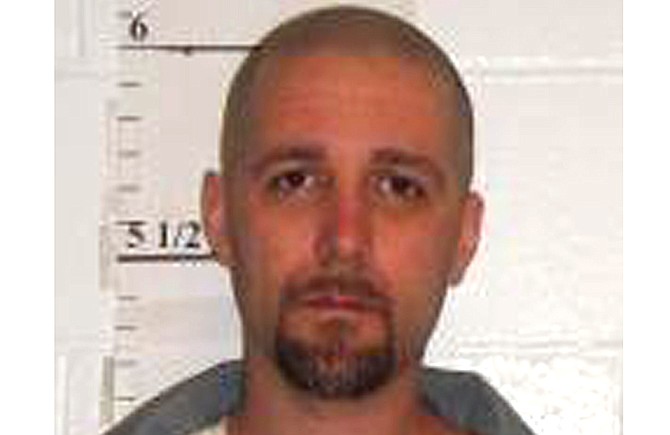After years of conducting few executions, Missouri is on track to send a record number of prisoners to the execution chamber in 2014.
Missouri's ninth execution of 2014 was scheduled to take place early this morning but was halted. A 10th is set to follow on Nov. 19.
Even as other states' execution procedures come under scrutiny, executions in Missouri continue thanks to reliable access to execution drugs, strong state-level support for capital punishment and conservative federal judges who regularly deny inmates' requests for stays.
"I don't like talking about human beings as a backlog, but essentially what we've seen is a backlog of cases working their way through the system," said Paul Litton, an MU law professor who teaches death penalty law.
Mark Christeson, who was convicted in a 1998 triple murder near Rolla, was scheduled to be put to death early this morning, but received a stay of execution late Tuesday night. The state last executed nine inmates in 1999, the most in a single year.
Sean O'Brien, a death penalty expert at the University of Missouri-Kansas City School of Law, said weak legal defense can also send prisoners to the execution chamber.
"It's a perfect storm of aggressive prosecutors, conservative courts and weak defense," O'Brien said. "When you put these things all together, this is what happens. Missouri has turned into Texas."
O'Brien said poor legal defense is particularly relevant in Christeson's case. His attorneys missed a 2005 filing deadline for federal review of his case.
Several court cases, a more liberal Missouri Supreme Court chief justice and an execution drug shortage nearly halted executions in Missouri between 2006 and 2012. A federal judge temporarily suspended Missouri's death penalty in 2006, pending the outcome of a cruel and usual punishment case. The state won the case, and the death penalty was reinstated in 2007. Missouri executed one inmate in 2009 and another in 2011 during a period when many states had trouble obtaining lethal injection drugs.
The recent uptick in executions correlates with an October 2013 announcement that Missouri's execution team would switch to a single drug, pentobarbital, for future executions. Since November 2013, the state has executed roughly one inmate a month.
Missouri's team and many other states' teams once used a three-drug combination before drug shortages forced them to change drugs. O'Brien said the new drug can explain only part of the increase in executions.
"(The Missouri death penalty is) a deep, deep subject," O'Brien said. "There are just a ton of layers to it. Every time you peel back a layer, there's more and more to it."
Rita Linhardt, board president of Missourians for Alternatives to the Death Penalty, said the pace of recent executions has given her group less time to organize before each execution. The group coordinates with defense attorneys to file amicus briefs and organize clemency letters. It also holds vigils in cities across Missouri before each execution and advocates for death penalty abolition.
"Our efforts have intensified because there have been so many executions, but our goals have remained the same," Linhardt said. "We used to have much more time. (The uptick in executions) puts more pressure on us and also on the attorneys."
Historically, Missouri is a leader in executions. With its next execution, Missouri will have executed 79 inmates; just four states, Texas, Oklahoma, Virginia and Florida, have executed more. O'Brien said execution rates have fallen in many other states, except Florida, which has seen an increase. Like Missouri, Florida has state-level legislators who support the death penalty and conservative federal judges in its district.
Litton said although the number of executions has increased in the past year, many government officials have always supported the death penalty.
"The support for the death penalty seems to just be stronger here," Litton said. "There are anti-death penalty voices, but there's support (for capital punishment) from both parties."
Gov. Jay Nixon, a Democrat, routinely denies prisoners' requests for clemency. In statements issued from his office, Nixon called reviewing clemency appeals "a process and a power of the Governor I do not take lightly" and has said he reviews the facts of each case before making a final decision. He granted clemency - commuting a death sentence to life in prison - once in 2011, but gave no explanation for his decision.
Attorney General Chris Koster, also a Democrat, is another staunch supporter of the death penalty. During the 2013 drug shortage, he suggested Missouri could revert to its gas chamber - an execution method that remains approved in the Revised Statues but has gone unused since 1965 - to allow executions to continue. More recently, he said the General Assembly should set aside funding for a state-run drug laboratory that would allow Missouri to manufacture its own pentobarbital. The state currently relies on an unnamed compounding pharmacy for the drug.
Missouri's reluctance to name its execution drug supplier has led to several pending lawsuits. O'Brien said the lawsuits are unlikely to slow the pace of executions. It's hard to say what would, unless the Supreme Court takes up a new death penalty case.
"Unless one of these dynamics changes, I don't know what's going to stop the train," O'Brien said.

